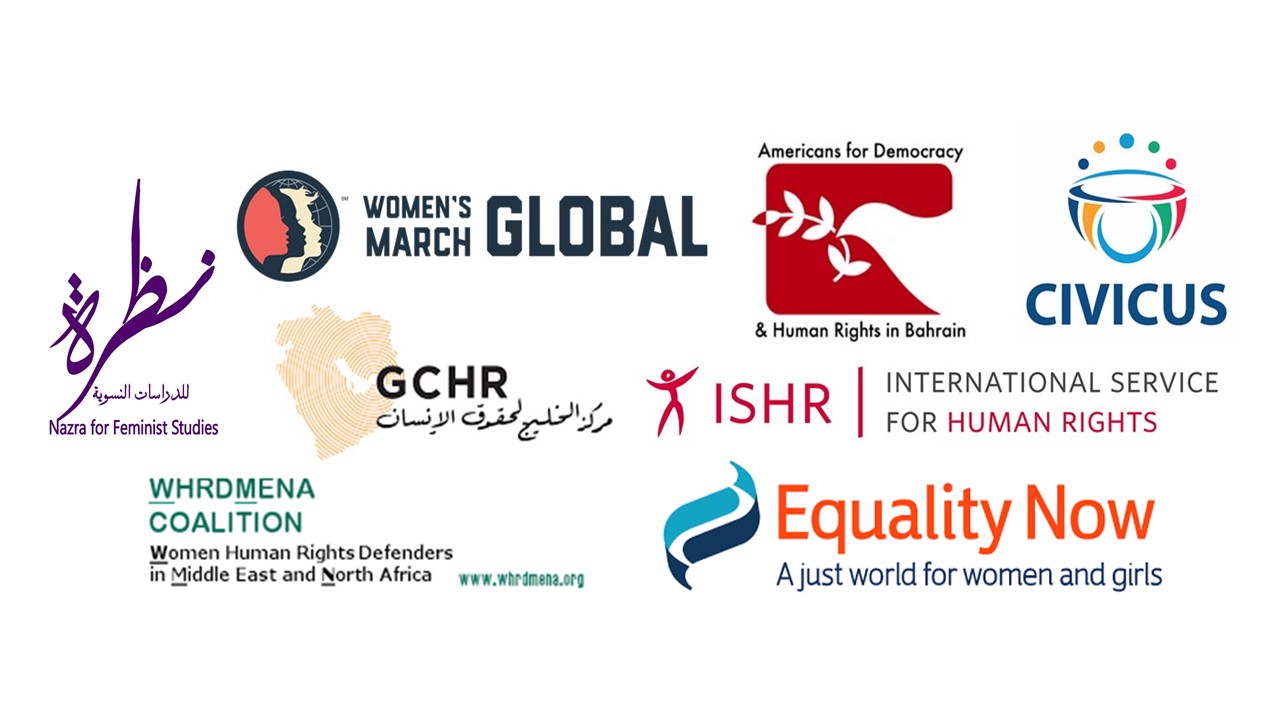**Update 13 March 2019 – A tweet from Loujain Al-Hathloul’s brother has indicated that her case has been transferred from the Specialized Criminal Court to the Criminal Court for trial.
Members of the Free Saudi Women Coalition – including Americans for Democracy & Human Rights in Bahrain (ADHRB) – have been advocating for the immediate and unconditional release of Saudi women human rights defenders. The following is a joint statement from Coalition partners and allies. Please find a pdf version of the joint statement here.
12 March 2019 – Dozens of women’s rights activists continue to be detained solely for demanding an end to the discriminatory male guardianship system and the right to drive. Loujain Al-Hathloul, a prominent Saudi woman human rights defender and one of the leaders of the right to drive campaign, is scheduled to appear on 13 March before the Specialized Criminal Court (SCC), which deals with terrorism cases. Other women human rights defenders may also appear in court tomorrow, however there has been a lack of information provided by authorities as to who they are. This will be the first time women human rights defenders who were arrested in mid-May 2018 will be brought to court since their arrest. They have been tortured, sexually harassed, intimidated, and targeted by smearing campaigns. The Saudi Crown Prince has claimed he is leading reforms to improve the situation of Saudi women, while at the same time the authorities are detaining and torturing women who have called for the same reforms for Saudi women, including the right to drive.
The trial against Loujain Al-Hathloul, and possibly other women human rights defenders, before the anti-terrorism court clearly demonstrates that the Saudi authorities view the demands of gender equality as a criminal and “terrorist” activity.[1] Women’s rights activists are equated to fundamentalist terrorists. The Saudi authorities have a zero-tolerance policy for any form of peaceful activism, including those calling for equality and advancing women’s rights in the country.
Despite claims by the Saudi Public Prosecution that all women detainees have their legal rights upheld, Loujain Al-Hathloul and her colleagues were not informed about the arrest warrant. Some were detained incommunicado with no access to their families or lawyers during the first three months of their detention. They were also not allowed the right to access an attorney to represent them during the investigation, which ended in early March.
For the first time ever, 36 States, including all members of the European Union, called on Saudi Arabia at the UN Human Rights Council in March 2019 to immediately and unconditionally release women human rights defenders who are being detained for exercising their fundamental rights. States also condemned the killing of journalist Jamal Khashoggi and demanded that those responsible be held accountable.
We call on the Saudi authorities to:
- Immediately and unconditionally release Loujain Al-Hathloul and all other detained women human rights defenders, and to drop all charges against them
- Ensure their rights to physical and psychological integrity
- Ensure their right to appropriate legal representation
- Ensure their right to fair and transparent trials in accordance with international standards of fair trials
- Ensure access to the trials by independent international monitors
We call on the international community to:
- Urge the Saudi authorities to implement the above recommendations
- Monitor the trial of the women human rights defenders and report publicly on its adherence with international standards
Since the arrest of the Saudi defenders, a coalition of civil society organizations have been campaigning for their immediate and unconditional release and calling for greater solidarity across the international community.
[1] In 2016 the Committee Against Torture in its second periodic report of Saudi Arabia expressed concern at the application of terrorism legislation, through Specialised Criminal Courts, which enables the criminalisation of acts of peaceful expression considered as ‘endangering national unity’ or ‘undermining the reputation or position of the State’. These courts, which have been used to try human rights defenders, violate international standards for the right to a fair trial and allow authorities to detain individuals without providing them with access to justice, including access to family members or legal representation.





